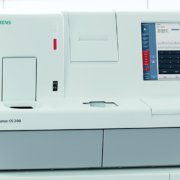Randox Cystatin C-Providing a true reflection of renal function
Did you know that up to 50% of renal function can be lost before significant creatinine elevation occurs? Unlike creatinine, Cystatin C does not suffer from this ‘blind area’. Cystatin C is extremely sensitive to very small changes in GFR and is therefore capable of detecting early stage kidney dysfunction. Furthermore, Cystatin C is a particularly useful marker of renal function in patients where creatinine measurements are not suitable e.g. individuals who are obese, malnourished, have liver cirrhosis or reduced muscle mass.
Cystatin C is a small (13 kDa) cysteine proteinase inhibitor that is produced at a constant rate by all nucleated cells. The small molecular weight of Cystatin C allows it to be completely removed and broken down by the kidneys, levels therefore remain steady if the kidneys are working efficiently and the Glomerular Filtration Rate (GFR) is normal.
For more information please click here
Email:
marketing@randox.com
Read more













